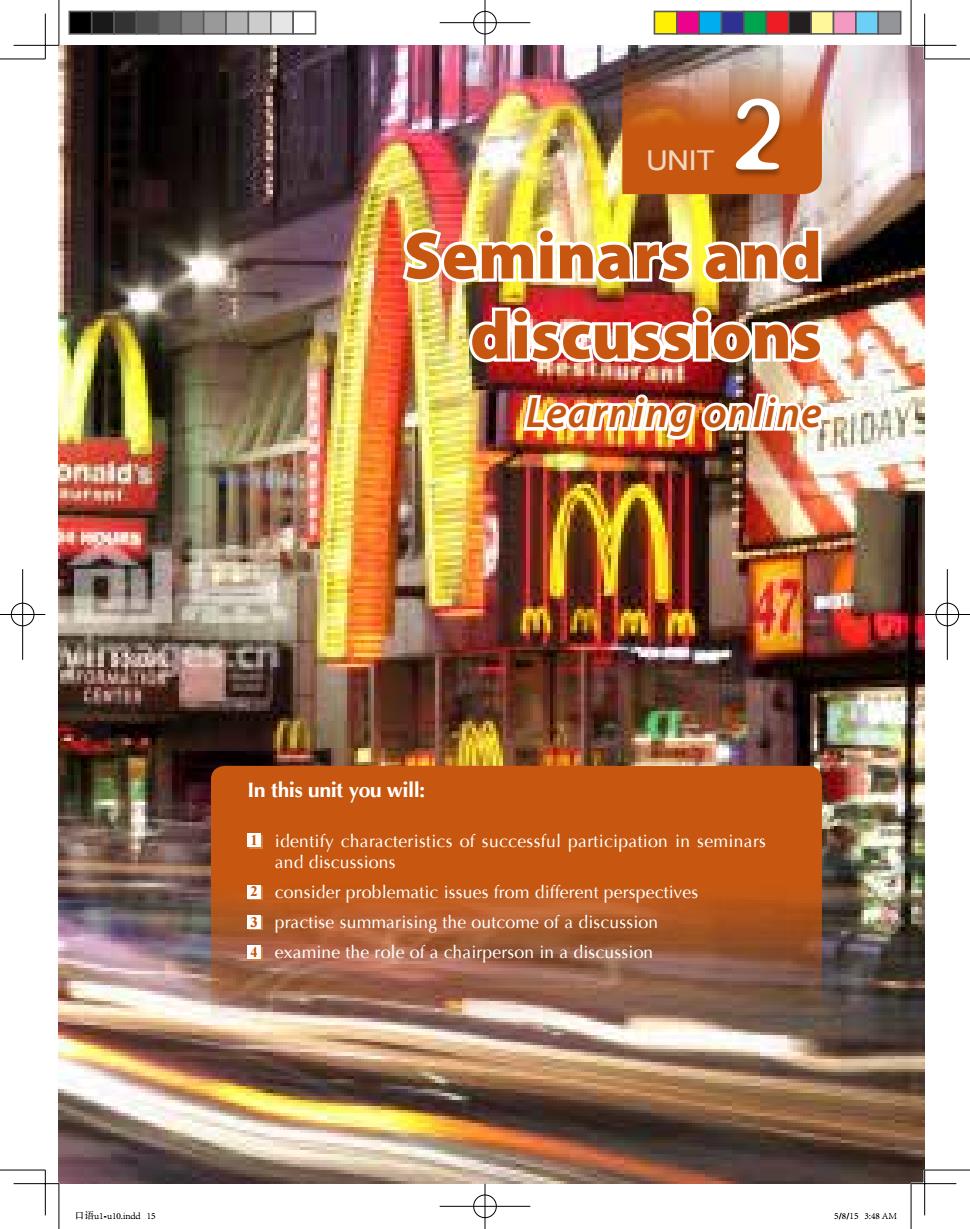
■■■■ R ■■□ UNIT Seminars and discussions Learning online:R m mim m In this unit you will: identify characteristics of successful participation in seminars and discussions consider problematic issues from different perspectives Bpractise summarising the outcome of a discussion examine the role of a chairperson in a discussion
Seminars and discussions Learning online UNIT 2 In this unit you will: 1 identify characteristics of successful participation in seminars and discussions 2 consider problematic issues from different perspectives 3 practise summarising the outcome of a discussion 4 examine the role of a chairperson in a discussion 口语u1-u10.indd 15 5/8/15 3:48 AM
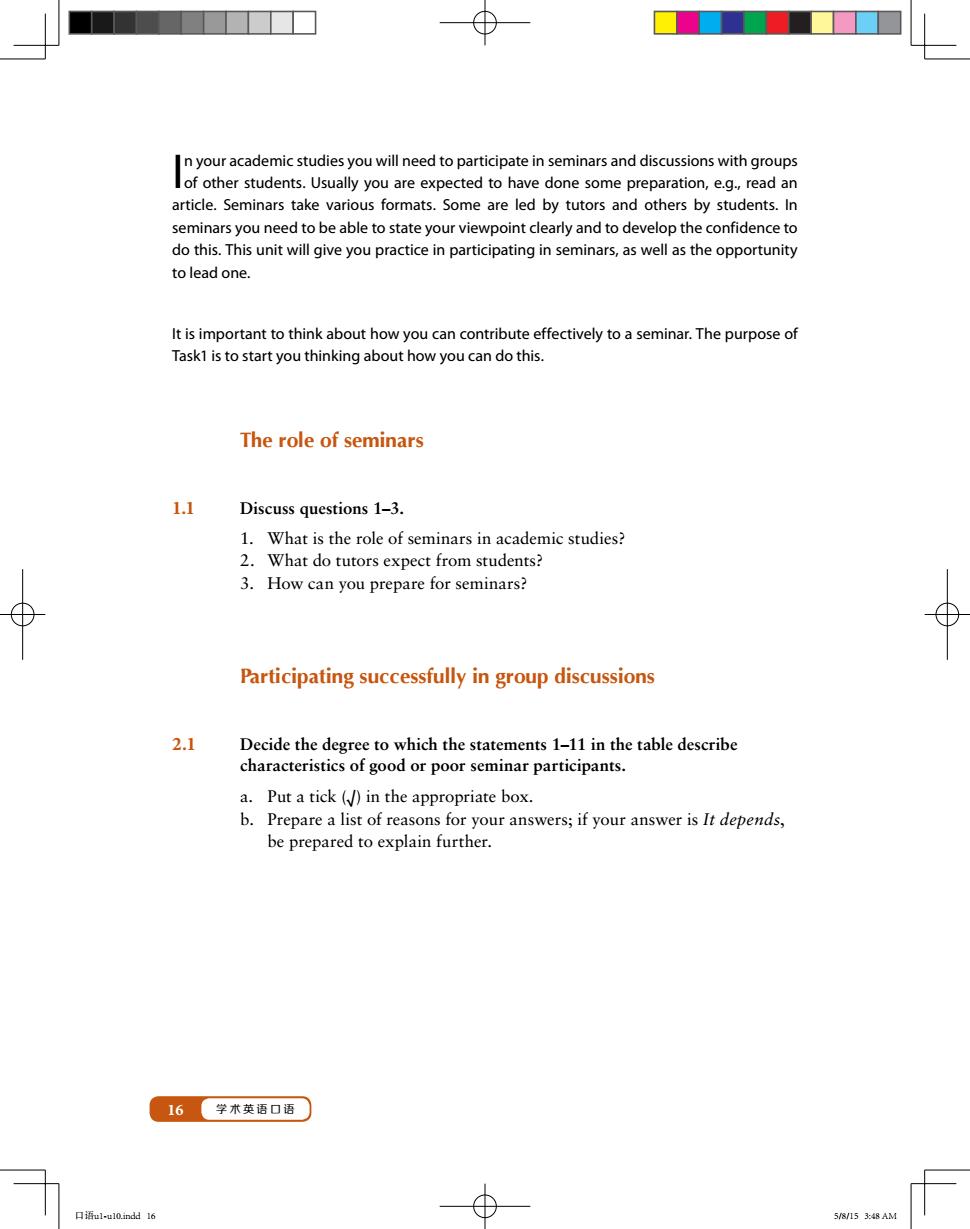
n your academic studies you will need to participate in seminars and discusions with group er students Us ted to ha n,e.g. article Seminars take vari us for Some are led by tuto others by stu ents.In seminars you need to be able to state your viewpoint clearly and to develop the confidence to do this.This unit will give you practice in participating in seminars,as well as the opportunity to lead one. It is important to think about how you can contribute effectively to a seminar.The purpose of Task1 is to start you thinking about how you can do this. The role of seminars 1.1 Discuss questions 1-3. 2. 3.How can you prepare for seminars Participating successfully in group discussions 2.1 Decide the degree to which the statements 1-11 in the table describe characteristics of good or poor seminar participants. a.Put a tick()in the appropriate box. 16学水英语口语 日itel-ul0indd16 5/15 3AM
I n your academic studies you will need to participate in seminars and discussions with groups of other students. Usually you are expected to have done some preparation, e.g., read an article. Seminars take various formats. Some are led by tutors and others by students. In seminars you need to be able to state your viewpoint clearly and to develop the confidence to do this. This unit will give you practice in participating in seminars, as well as the opportunity to lead one. It is important to think about how you can contribute effectively to a seminar. The purpose of Task1 is to start you thinking about how you can do this. Task 1 The role of seminars 1.1 Discuss questions 1–3. 1. What is the role of seminars in academic studies? 2. What do tutors expect from students? 3. How can you prepare for seminars? Task 2 Participating successfully in group discussions 2.1 Decide the degree to which the statements 1–11 in the table describe characteristics of good or poor seminar participants. a. Put a tick (√) in the appropriate box. b. Prepare a list of reasons for your answers; if your answer is It depends, be prepared to explain further. 16 学术英语口语 口语u1-u10.indd 16 5/8/15 3:48 AM
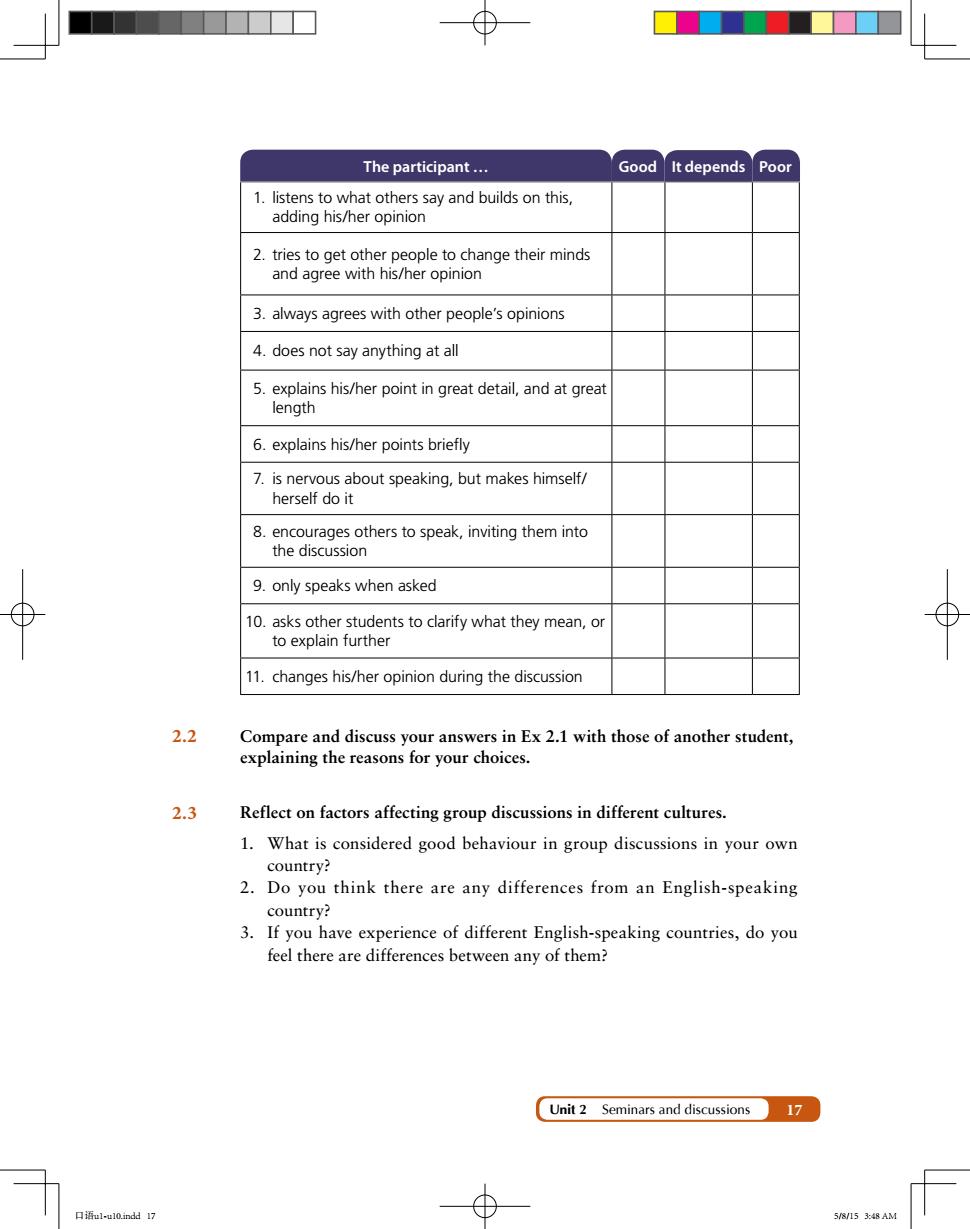
The participant. Good It depends Poor 1.listens to what others say and builds on this. adding his/her opinion 3.always agrees with other people's opinions 4.does not say anything at all 5gmshsepomngetttlan时tge 6.explains his/her points briefly 7.is nervous about speaking,but makes himself/ herself do it 8.encourages others to speak,inviting them into the discussion 9.only speaks when asked 0.what they mean, to explain further 11.changes his/her opinion during the discussion 2.2 Compare and discuss your answers in Ex 2.1 with those of another student, explaining the reasons for your choices. 2.3 Reflect on factors affecting group discussions in different cultures. 1.What is considered good behaviour in group discussions in your own country? 2.Do you think there are any differences from an English-speaking 3.If you have experience of different English-speaking countries,do you feel there are differences between any of them? Unit 2 Seminars and discussions
The participant . Good It depends Poor 1. listens to what others say and builds on this, adding his/her opinion 2. tries to get other people to change their minds and agree with his/her opinion 3. always agrees with other people’s opinions 4. does not say anything at all 5. explains his/her point in great detail, and at great length 6. explains his/her points briefly 7. is nervous about speaking, but makes himself/ herself do it 8. encourages others to speak, inviting them into the discussion 9. only speaks when asked 10. asks other students to clarify what they mean, or to explain further 11. changes his/her opinion during the discussion 2.2 Compare and discuss your answers in Ex 2.1 with those of another student, explaining the reasons for your choices. 2.3 Reflect on factors affecting group discussions in different cultures. 1. What is considered good behaviour in group discussions in your own country? 2. Do you think there are any differences from an English-speaking country? 3. If you have experience of different English-speaking countries, do you feel there are differences between any of them? Unit 2 Seminars and discussions 17 口语u1-u10.indd 17 5/8/15 3:48 AM
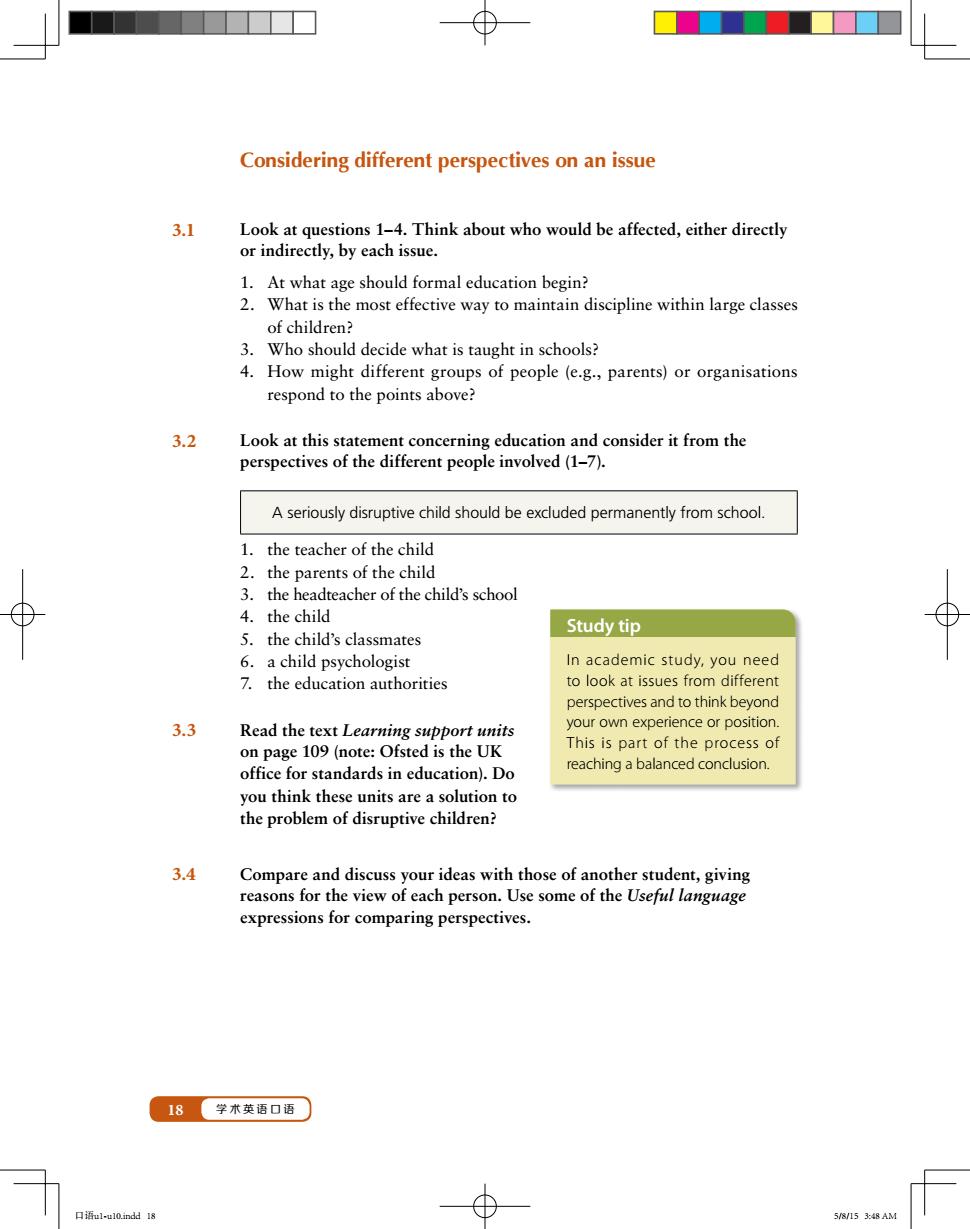
Considering different perspectives on an issue 3.1 Look at questions 1-4.Think about who would be affected,either directly or indirectly,by each issue. 1.At what age should formal education begin? 2.What is the most effective way to maintain discipline within large classes of children? 3.Who should decide what is taught in schools? 4.How might diffe rent groups of people (e.g.,parents)or organisations respond to the points above? 3.2 Look at this statement concerning education and consider it from the perspectives of the different people involved(1-7). A seriously disruptive child should be excluded permanently from school. the teacher of the child the parents of the child the headteacher of the child's school 4.the child Study tip 5 the child's classmates 6.a child psychologist In academic study,you need 1. the edu ion authorities to look at issues from different perspectives and to think beyond 3.3 Read the text Learning support units your own experience or position on page 109 (note:Ofsted is the UK This is part of the process of office for standards in education).Do reaching a balanced conclusion. you think these units are a solution to the problem of disruptive children? 3.4 ideas with those of anoth rstudent,giving fof ach person.Use some of the Usee expressions for comparing perspectives. 18学水英语口语 ifel.ul0 indd I8 5/15 3AM
Task 3 Considering different perspectives on an issue 3.1 Look at questions 1–4. Think about who would be affected, either directly or indirectly, by each issue. 1. At what age should formal education begin? 2. What is the most effective way to maintain discipline within large classes of children? 3. Who should decide what is taught in schools? 4. How might different groups of people (e.g., parents) or organisations respond to the points above? 3.2 Look at this statement concerning education and consider it from the perspectives of the different people involved (1–7). A seriously disruptive child should be excluded permanently from school. 1. the teacher of the child 2. the parents of the child 3. the headteacher of the child’s school 4. the child 5. the child’s classmates 6. a child psychologist 7. the education authorities 3.3 Read the text Learning support units on page 109 (note: Ofsted is the UK office for standards in education). Do you think these units are a solution to the problem of disruptive children? 3.4 Compare and discuss your ideas with those of another student, giving reasons for the view of each person. Use some of the Useful language expressions for comparing perspectives. Useful language: Comparing perspectives From (a teacher’s) perspective, . If I were (the headteacher of the child’s school), I’d probably feel that . (The child psychologist) would argue that . From the point of view of (the parents), . 3.5 Now listen to a student comparing different perspectives on the statement in Ex 3.2. What does the speaker say about the views of those involved? Task 4 Reaching a balanced conclusion 4.1 Look at the following statements about school education. • Corporal punishment is necessary to maintain discipline. • Children should be given formal tests and exams from the age of six. • Children should be allowed to leave school at 16 if they wish. • Parents should be allowed to educate children at home if they wish. • Children should be able to choose which subjects they want to study at the age of 15. Consider each statement from the perspective of three or four different people who might be affected. Consider: 1. how they would view the issue 2. the long- and short-term implications of the statements In addition to the people mentioned in Ex 3.2, think about the viewpoints of other sectors of society – such as young people or employers – and society as a whole. 4.2 Now record your points using the table in Appendix 2 (page 175). Remember you are recording what you think the views of those directly involved might be, not your own views. 5 Study tip In academic study, you need to look at issues from different perspectives and to think beyond your own experience or position. This is part of the process of reaching a balanced conclusion. 18 学术英语口语 口语u1-u10.indd 18 5/8/15 3:48 AM
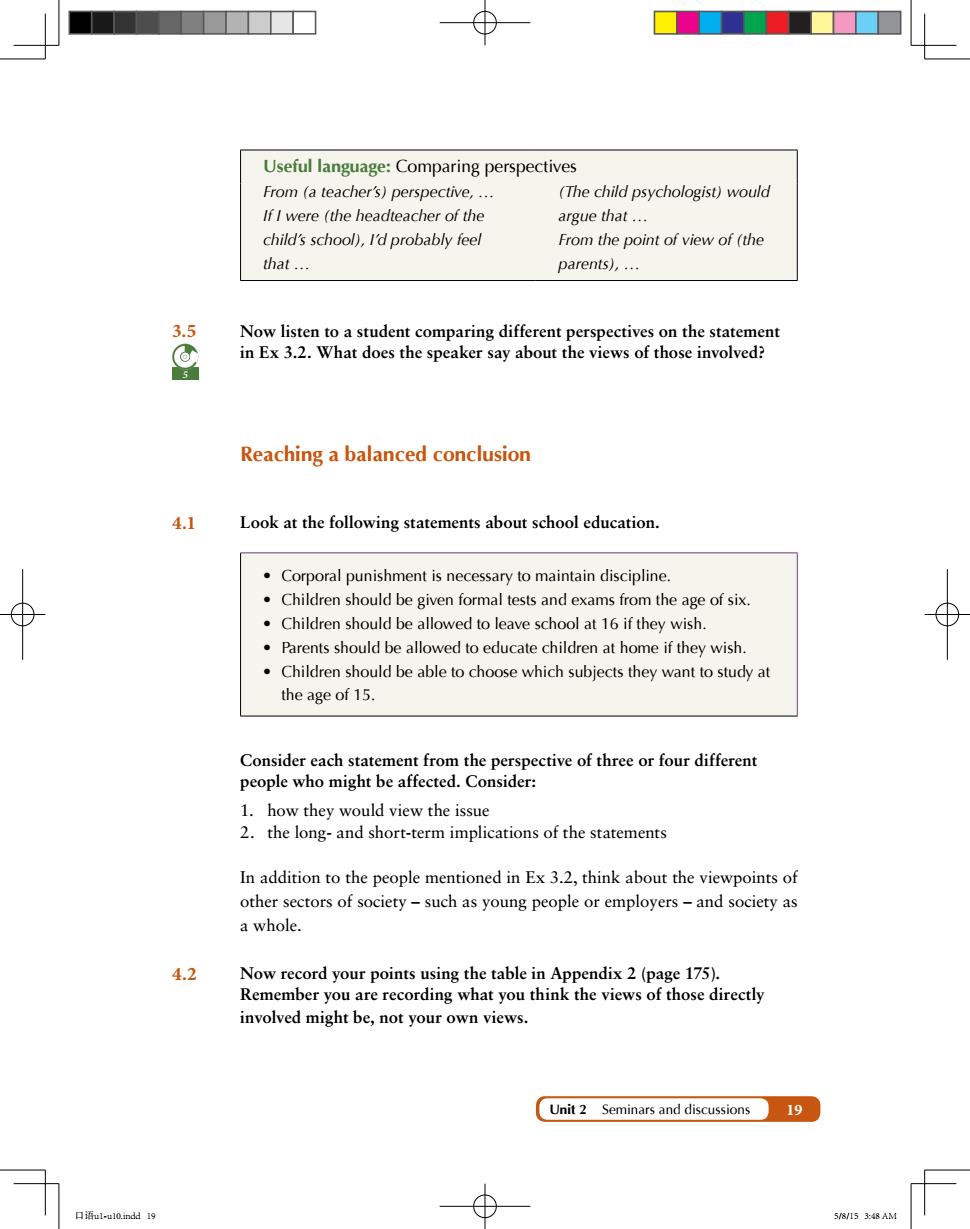
Useful language:Comparing perspectives From (a teachers)perspective (The child psychologist)would If I were (the headteacher of the argue that. child's school),I'd probably feel From the point of view of (the that. parents),. 3.5 Now listen to a student comparing different perspectives on the statement in Ex 3.2.What does the speaker say about the views of those involved? Reaching a balanced conclusion Look at the following statements about school education. .Children should be allowed to leave school at 16 if they wish. Parents should be allowed to educate children at home if they wish. .Children should be able to choose which subjects they want to study a the age of 15. Consider each statement from the perspective of three or four different people who might be affected.Consider: 1.how they would view the issue 2.the long-and short-term implications of the statements In addition to the people mentioned in Ex 3.2,think about the viewpoints of other sectors of society-such as young people or employers-and society as a whole. 4.2 oints using the table in ndix 2(pag 175 eme are recordi e views of those directly involved might be,not your own views. Unit 2 Seminars and discussions
Useful language: Comparing perspectives From (a teacher’s) perspective, . If I were (the headteacher of the child’s school), I’d probably feel that . (The child psychologist) would argue that . From the point of view of (the parents), . 3.5 Now listen to a student comparing different perspectives on the statement in Ex 3.2. What does the speaker say about the views of those involved? Task 4 Reaching a balanced conclusion 4.1 Look at the following statements about school education. • Corporal punishment is necessary to maintain discipline. • Children should be given formal tests and exams from the age of six. • Children should be allowed to leave school at 16 if they wish. • Parents should be allowed to educate children at home if they wish. • Children should be able to choose which subjects they want to study at the age of 15. Consider each statement from the perspective of three or four different people who might be affected. Consider: 1. how they would view the issue 2. the long- and short-term implications of the statements In addition to the people mentioned in Ex 3.2, think about the viewpoints of other sectors of society – such as young people or employers – and society as a whole. 4.2 Now record your points using the table in Appendix 2 (page 175). Remember you are recording what you think the views of those directly involved might be, not your own views. 5 Unit 2 Seminars and discussions 19 口语u1-u10.indd 19 5/8/15 3:48 AM